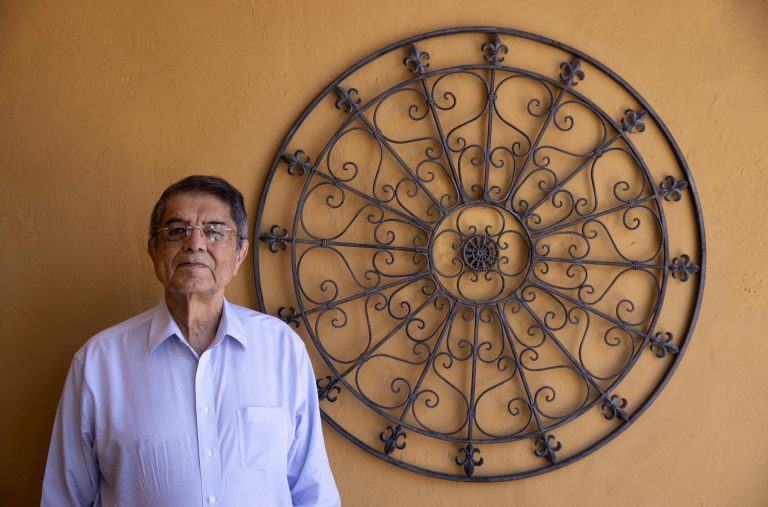3 de julio 2023

European Concern over Lack of Academic Freedom in Nicaragua

PUBLICIDAD 1M
PUBLICIDAD 4D
PUBLICIDAD 5D
Three pick-ups full of riot police from Managua participated in the illegal takeover of the Luisa Mercado Foundation in Masatepe, closed months prior

El escritor nicaragüense Sergio Ramírez. EFE/Orlando Barría
On Friday, June 30, Police under the orders of the Ortega-Murillo dictatorship burst into the locale of the Luisa Mercado Foundation in Masatepe, Masaya and seized the property. The Foundation itself had been shuttered by the Ortega regime last April, one of thousands of non-profits arbitrarily outlawed. Prior to its closure, the cultural foundation had been chaired by novelist and Cervantes Prize winner, Sergio Ramírez Mercado, now exiled in Spain.
According to sources from Masatepe, the authorities deployed a multitude of police agents to appropriate the property, The police patrol assigned to the city was joined by three police pick-ups carrying riot police from Managua, all dispatched to guarantee the confiscation of the center, where a music school and a spacious library formerly operated. These services, however, had been closed for months.
Miguel Mendoza, a former sports columnist, and political prisoner, now exiled in the US, released the first images of one of the broken doors of the colonial-style house – a consequence of the brutality of the officers involved in the illegal seizure. Mendoza chronicled the event on his social media feed.
The legal status of the Luisa Mercado Foundation was canceled by the Ortega dictatorship on April 19, 2022, along with the annulment of another 24 organizations that day alone. The closure of non-governmental organizations in the country has been an integral part of the regime’s persecution of civil society. More than 3,000 organizations have been shuttered nationwide since 2018.
Sergio Ramirez, Daniel Ortega’s vice president during the initial Sandinista government from 1985 to 1990, has been a vocal critic of Ortega for the past 28 years. He is also one of Nicaragua’s most renowned literary figures, who has been honored for the quality of his work by the Cervantes prize for literature, the Carlos Fuentes prize, and the Alfaguara Award, among others. In addition, he’s been a tireless cultural promotor via the annual Centroamerica Cuenta Festival. For a decade, the festival has brought together writers from the region, as well as sponsoring over 400 events with the most representative literary voices of Latin America, Spain, France, Germany, and the United States.
During the last few years, the writer has suffered active persecution from the tyranny. He was banished from the country following the publication of his novel Tongolele no sabia bailar [“Tongolele couldn’t dance”, published by Alfaguara], which tells the story of a State Security spy in a country hit hard by repression. His book has been banned in Nicaragua.
On February 15, 2023, the Ortega Courts also stripped Ramirez of his Nicaraguan nationality, along with a group of 222 released and banished political prisoners and another 93 opponents of the regime who had fled the country. All of them had their assets, homes and any other properties confiscated after they were declared “traitors to the homeland.” Based on that resolution, the Nicaraguan Supreme Court also annulled Ramirez’ law degree.
After being stripped of his passport and nationality by the Ortega regime, Ramirez accepted the offers of both Columbia and Ecuador to grant him their nationality. He had already been awarded Spanish citizenship in 2018 for his literary merits. The novelist has not yet reacted publicly to Friday’s confiscation of the Masatepe center, but on other occasions he has denounced the pretensions of the Nicaraguan rulers to end all expressions of liberty and democracy, as he expressed when the regime first ordered the closure of the Luisa Mercado Foundation.
Sergio Ramirez has maintained a permanent message on his Twitter account since the dictatorship’s decision to take away his Nicaraguan nationality. “Nicaragua is what I am and all I have, and I’ll never stop being, nor ever stop having, my memory and my recollections, my language and my writing, my struggle for its freedom, on which I’ve pledged my word. The more they take Nicaragua away from me, the more Nicaragua I have.”
This article was originally published in Spanish in Confidencial and translated by Havana Times.
PUBLICIDAD 3M
Periodista nicaragüense, exiliado. Comenzó su carrera en el año 2000, cuando todavía era estudiante. Por sus destacadas investigaciones periodísticas ha ganado el Premio Ortega y Gasset, el Premio Internacional de Periodismo Rey de España, el Premio a la Excelencia de la Sociedad Interamericana de Prensa, y el Premio Latinoamericano de Periodismo de Investigación del Instituto Prensa y Sociedad (IPYS).
PUBLICIDAD 3D